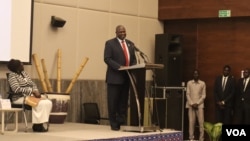Machar told participants attending the International Conference on Women's Transformational Leadership in Juba this week that if South Sudanese women form a union, the government will pass laws that safeguard their interests.
“If you have a women’s union, it will always be knocking at [the] door of the vice president, of the minister, the governor and the state because women's union is non-political. It even makes a lot of programs and sells it to the ministry and to the office of the vice president and to the government,” Machar said.
Machar, who is in charge of governance cluster, said women’s groups in South Sudan have enough time to position themselves strategically and seize opportunities.
“We still have to enact a legislation for women enterprise development fund. That is for the minister to initiate the process. But if you don’t have a women union, you have difficulties influencing that legislation, so we need to do something about that,” Machar said.
Roda Athanasio, chairperson of the nonprofit South Sudan Women with Disabilities Network, said women’s groups should cooperate with each other, get organized and compete for opportunities.
“I really learned many things about the leadership and then about us as the women. We have to empower each other and stand with each other, and help ourselves because we want to lead this country to go up,” Athanasio said.
Rebecca Nyadeng De Mabior, South Sudan’s vice president in charge of the gender and youths cluster, said the resolutions of the women’s conference should be implemented unlike in the past.
“We don’t want to leave those recommendations on paper like other resolutions which have been passed by the government and never implemented. These ones, if I cannot remember, you remind me. You remind our minister of our resolutions because we don’t want to just leave them like that,” Nyadeng said.
Some activists who attended the conference said without women's participation in South Sudan’s political decision-making process, the country’s transformation will be difficult.
Betty Murungi, one of the conference’s facilitators, says the timing of this conference is critical as there are key ongoing national processes which require the full and effective engagement and participation of women.
The 2018 peace agreement required South Sudan to hold its first general election in February 2023, but last year, the parties agreed to extend the transitional period by another two years until 2025.
Amer Manyok, chairperson of the South Sudan Women's Bloc who took part in the conference, said women face many challenges that make political participation difficult.
“As we speak, our girls and boys are on the street; they are on the street because of so many issues. One is economic crisis. Secondly, environmental hazards like floods affecting areas; people are displaced since 2013 up to today,” Manyok said.





![Women's Participation Critical to SSudan Peace: Activists [4:32]](https://gdb.voanews.com/01000000-0aff-0242-ab61-08db0dfabcfc_w33_r1.jpg)
